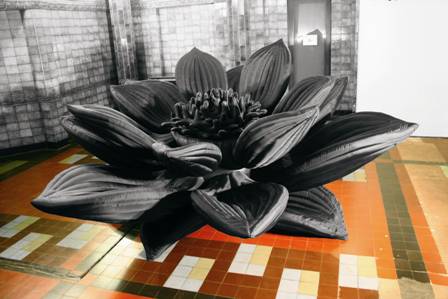 |
|
|---|---|
| CP Foundation | About CP Biennale | 2003 | 2005 | Contact Us | |
         
|
|
|
Lotus Choi Jeong Hwa was born in 1961 and now lives and works in Seoul, South Korea. Choi Jeong Hwa has taken part in a number of international exhibitions, such as the Venice Biennale in Italy (2005); the Liverpool Biennale, Lime Station, England (2004); “Happiness”, Mori Art Museum, Roppongi Hill, Tokyo, Japan (2003); Baltic Triennial of International Art VIII, Contemporary Art Center, Vilnius, Lithuania (2002); “Orient Extreme”, Le Lieu Unique, Nante, France (2002); Yokohama Triennale, Japan (2001); and an exhibition in Lunapark, Stuttgart, Germany (2001). The shaping of city within the space of modernity results in a uniformity of life. Any person who consciously celebrates life must struggle against the social conformity emerging from the industrial capitalism that traps him or her. Since the emergence of the flaneur figure introduced by Charles Baudelaire in Paris in the 19th century, a defense has been made for exoticism, expanding the space that separates an individual from the subjects/ objects which he or she comprehends. It is this space that enables a person to enliven the strength of imagination and the productive sense-of-alienation. The attitude of exoticism exists in several things: it does not exist solely within a specific cultural expression, but also in the context of the existence of nature. A defender of exoticism, Victor Segalen, once explained that only through nature will we truly understand exoticism for the first time; nature, which we then suddenly perceive as being different from our own existence. Segalen (2002) believes: “For the feeling for nature only came into existence when man began to conceive of nature as different from himself.” The processes of human logic Lotus by Choi Jeong Hwa beckons us once again toward the perception of exoticism, toward the feeling of alienation that can continuously prick our awareness. This kind of consciousness covers not only our perception of nature, but also our existence within the nature. The creation of mega-cities and urban spaces not only “alienates” us from nature, but also gives rise to the issue of the existence of humankind. This “alienation” is certainly different from the sense of exotic separation that brings a sense of aliveness to our existence. This condition of alienation has come about simply because we become trapped in the routine of social conformity. Any number of questions may arise and challenge us when we discover the signs of “alienation” in the piece titled Lotus. These are triggered by the use of color and form, as well as by the size of the blossom we have encountered. Lotus simultaneously reminds us of the problem of artificiality. This piece clearly does not intend to promote the success of modernity that dominates nature by creating an imitation of it. Instead, this work motivates us to keep a distance from nature, or to “allow” nature to be different from us. This way, we can continue to learn much from it, and fight our desire to make nature a part of ourselves. We understand that we are only a part of the nature's existence. (Rizki A Zaelani) |
|
|
CP foundation | About CP Biennale | 2005 Biennale | 2003 Biennale | Contact Us
Jl. Suryopranoto 67A, Jakarta 10160, Indonesia. ph. +62.21.3448126, 3853206 | fax. +62.21.3853203, 3853208 info@cp-foundation.org |
